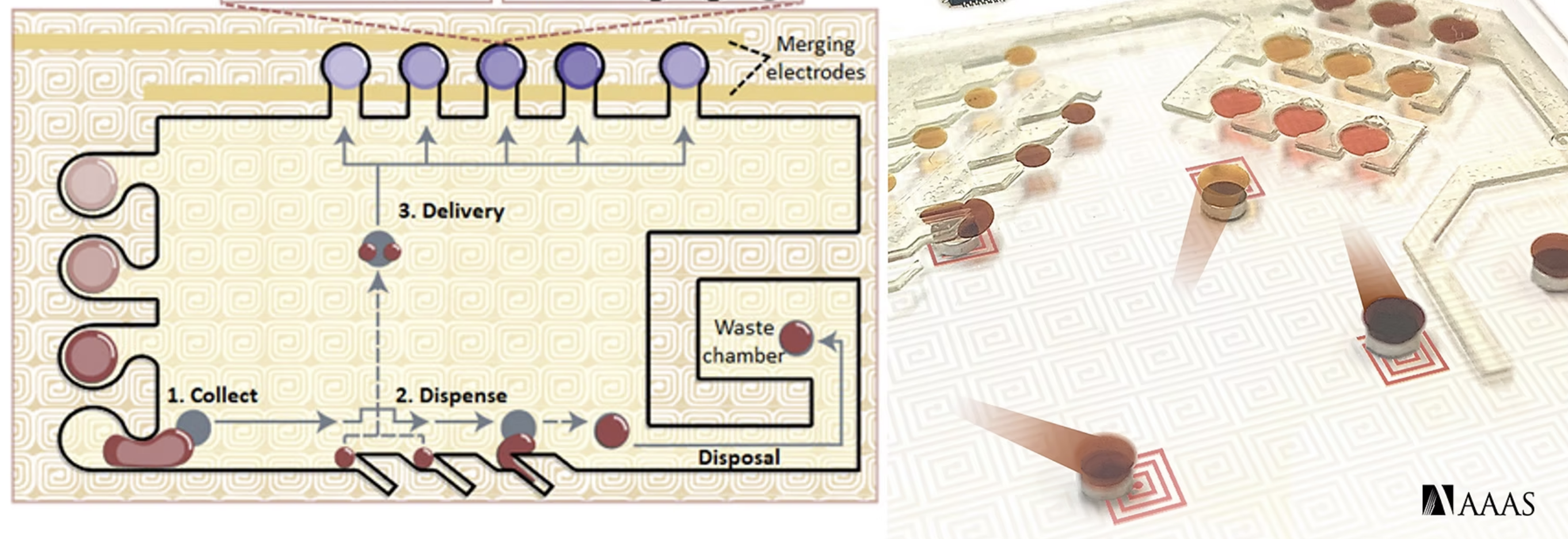Interconnected and Integrated Bioelectronics Lab (I²BL) @ UCLA

About I²BL
The Interconnected and Integrated Bioelectronics Lab (I²BL) at UCLA is a cutting-edge research facility dedicated to advancing the field of bioelectronics and medical device development. Our lab focuses on creating innovative solutions that bridge the gap between engineering and medicine.
Ferrobtic Group for Accessible and Adaptable Automated Viral Testing
Mission Statement
Our mission is to realize personalized medicine for everyone. We create new bioelectronics to:
- Engineer Materials: Develop materials with specialized properties (e.g., soft, strain-insensitive, stimuli-responsive)
- Develop Sensing Methodologies: Create micro/nanoscale actuation and sensing methodologies to control, isolate, and sense a spectrum of biomarkers (e.g., electrochemical sensors to measure metabolites, electrolytes, nutrients, hormones, and pharmaceuticals)
- Fabricate Platforms: Optimize microfluidic PCB-based platforms to interface with biological entities such as biofluid and tissue
Research Approach
In our approach, we emphasize solutions that are:
- Simple: Easy to understand and implement
- Low-Cost: Affordable and accessible
- Scalable: Can be implemented in various settings
- Innovative: Providing new functionalities to bypass performance boundaries of conventional biomedical tools
Research Areas
Biomaterials Development
- Biocompatible Materials: Creating materials that work harmoniously with biological systems
- Electroactive Polymers: Developing materials that respond to electrical stimulation
- Tissue Engineering: Creating scaffolds for tissue regeneration
- Biodegradable Materials: Ensuring materials break down safely in the body
Sensing Technologies
- Electrochemical Sensors: Detecting various biomarkers in biological fluids
- Microfluidic Systems: Creating precise fluid control systems
- Biosensors: Developing sensors that respond to biological molecules
- Wearable Devices: Creating comfortable, long-term monitoring solutions
Medical Device Development
- Diagnostic Platforms: Creating accessible testing solutions
- Therapeutic Devices: Developing treatment delivery systems
- Monitoring Systems: Creating continuous health monitoring solutions
- Point-of-Care Devices: Bringing testing closer to patients
Current Projects
Automated Viral Testing
Our flagship project focuses on developing accessible and adaptable automated viral testing platforms that can be deployed in various settings, from clinical laboratories to remote locations.
Biomarker Detection
We’re developing sensors to detect a wide range of biomarkers including:
- Metabolites: Glucose, lactate, and other metabolic markers
- Electrolytes: Sodium, potassium, and other essential ions
- Nutrients: Vitamins and essential nutrients
- Hormones: Various hormonal markers
- Pharmaceuticals: Drug monitoring and therapeutic levels
Microfluidic Systems
Our microfluidic PCB-based platforms enable:
- Precise Control: Accurate manipulation of biological fluids
- Integration: Seamless connection with electronic systems
- Scalability: Easy production and deployment
- Reliability: Consistent performance in various conditions
Clinical Applications
Personalized Medicine
By integrating our solutions into autonomous bioanalytical platforms and collaborating closely with prominent clinical experts and medical centers, we hope to translate our technologies in clinical applications.
Patient Care
Our technologies aim to:
- Improve Diagnosis: Faster and more accurate diagnostic capabilities
- Enhance Treatment: Better monitoring and delivery of therapies
- Reduce Costs: More affordable healthcare solutions
- Increase Access: Bringing advanced diagnostics to underserved areas
Collaboration and Partnerships
Academic Partnerships
We collaborate with various departments and institutions to advance our research:
- UCLA Engineering: Electrical, mechanical, and materials engineering
- UCLA Medical School: Clinical expertise and patient access
- Other Universities: National and international collaborations
Industry Partnerships
We work with industry partners to:
- Commercialize Technologies: Bringing innovations to market
- Scale Production: Manufacturing solutions at scale
- Clinical Validation: Testing in real-world settings
- Regulatory Compliance: Meeting healthcare standards
Future Directions
Technology Development
We plan to expand our research in:
- Advanced Materials: Next-generation biomaterials
- Smart Devices: Intelligent diagnostic and therapeutic systems
- Integration: Seamless connection between devices and healthcare systems
- Automation: Fully automated diagnostic and treatment platforms
Clinical Translation
Our goal is to:
- Validate Technologies: Prove effectiveness in clinical trials
- Obtain Approvals: Meet regulatory requirements
- Deploy Solutions: Bring technologies to patients
- Monitor Impact: Track improvements in patient outcomes
Get Involved
For Students
We welcome students interested in:
- Research Opportunities: Undergraduate and graduate research positions
- Learning: Understanding the intersection of engineering and medicine
- Innovation: Contributing to cutting-edge medical technology development
- Career Development: Building skills for future careers in medical technology
For Collaborators
We seek partnerships with:
- Clinical Researchers: Healthcare professionals interested in new technologies
- Industry Partners: Companies looking to commercialize medical innovations
- Funding Organizations: Organizations supporting medical technology development
- Patient Advocates: Representatives of patient communities
Related Pages:
- Projects - My engineering projects in medical technology
- Medical Research - My medical research work
- Resume - My professional background and experience
Contact Information: For questions about I²BL or collaboration opportunities, please contact me at michaelshara@g.ucla.edu